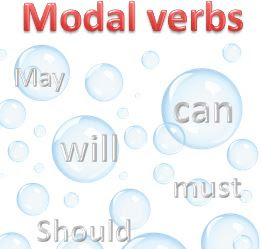Verb: Modals
*A verb used to express the mood or attitude of a speaker is called a modal.
* The most commonly used modals are:
can, could, may , might , will , would, shall, should , must , ought to, need , dare.
And these modals are used to suggest:
.1 permission
2.ability
3.possibility
4 suggestion, advice, duty,( obligation)
5. promise.
6.. intention
7.request
8.necessity, compulsion
9.prohibition
10.wish
NOTE: Modals are always followed by a main verb, They cannot stand on their own unless they are used in a question tag.
Example- You can park your car in front of our gate. (modal' can' is used before main verb)
You can lift this bag, can't you? ( in question tag, can be used alone)
* Modals always have the same form. They do not change form with the person and number of the subject.
Example- You must do
He must do
They must do etc.
*The main verb used after a modal is always the root word.Present participle,past and past participle
forms of a verb are never used with a modal.
Permission: may, can and could
The above three modals are used to suggest permission.
Can is informal
May is polite
Could is more polite
Two friends are talking
Anu: Can I use your book, Sonu? ( Informal talk being friends)
Sonu: Yes, you can, But keep it safely.
Since they are friends ,they don't have to be formal.
A student talking to the teacher( formal relation)
Bin: May I go to the library , Madam.
Teacher: Yes ,you may.
A subordinate talking to his officer.
Jack: Sir, could you grant me two days' leave? ( very polite being a subordinate)
Officer: You may take if there is no emergency in the office.( formal permission by the officer)
Ability: can, could, be able to
Can: Used to express ability , capability in the present. Ex. She can dance well.
Could: Ability in the past is expressed by could. Ex. She could dance very well in her youth.
Be able to: It also expresses ability and can be used in any tense:
1.He is able to swim well.
2.He was able to swim well in his young age.
3.I am sure I will be able to attend the function tomorrow.
Possibility: may, might, could
May suggests a good possibility:
Cool down. Your wallet may be in your bag.
Might suggests a weak possibility and could still weaker possibility.
Could also suggests a very weak possibility in the future
Example- Your wallet might be in your bag.( weak possibility)
Your wallet could be in your bag.( a very weak possibility)
She could come tomorrow.( a very weak possibility in the future)
Suggestion, advice, duty,( obligation) should, ought to
Should : It is used to express suggestion or advice:
Should we start doing the homework?( suggestion)
We should include another member in our team?( suggestion)
You should try to improve your hand writing.( advice)
Ought to is a little stronger than should. It suggests that something is the right thing to do. It also conveys a sense of duty:
We ought to take care of our old parents.( moral duty)
You are not looking fit. You ought to go for a morning walk daily.( This is the right thing to do)
Promise: will , shall
Will & shall are used to suggest promises. Normally shall is used with first person subject and will with all persons. But if a promise is to be suggested, will is used with first person subjects and shall with other persons..
We will attend your birthday party.( It is our promise)
You shall get a new dress on your birthday.( It's my promise)
Intention: will, shall
Normally will and shall suggest intention or willingness:
I shall ring you in the morning.( intention)
He will help you with your work.( intention/willingness)
Request: would, can, could
Would you buy me some new clothes ?( polite request)
Could you pass me the salt ?( polite request)
Can I have some water?( informal request)
Necessity, compulsion: must, have to, had to, have got to, will have to
We are getting late. We must take the taxi. (necessity)
You must pay the dues on time.( compulsion)
In the army you have to clean your shoes yourself.( compulsion)
Since he was not t home, we had to wait for him.( necessity ,in past tense)
I have got to finish this work by evening.( necessity/ compulsion)
I will have to go and get some medicine.( necessity, in future tense)
Must, have to
Must suggests desire of the speaker. Have to suggests an external compulsion:
You must pay the dues on time.( speaker wants the dues to be paid on time)
In the army you have to get up early in the morning.( army rules require everybody to get up early in the morning)
Need't It suggests that there is no necessity or compulsion:
You need't go to the doctor.
Prohibition: must not, ought not to
Cars must not be parked in front of the gate.( It is prohibited to park cars in front of the gate)
You ought not to make fun of an old man.( As a duty , you should not make a fun of an old man.)
Wish: may
May is normally used to express a wish:
May you live long!
Dare. It is mostly used in negative and interrogative sentences:
I daren't climb that tall tree.
Dare you challenge him to a fight? No, I daren't
Dare can also be used as a normal verb:
I don't dare to climb that tall tree.
Do you dare challenge him to a fight?No I don't.
Lets revise: https://youtu.be/Nk9nQwoCFig











0 comments:
Post a Comment